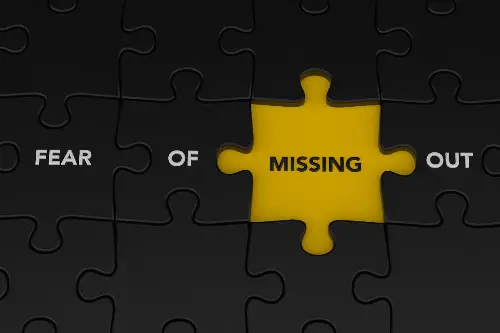As we navigate the myriad of subcultures and paradigms shifting beneath our digital age, few are as enigmatic as Generation Z. Born into a world where the internet is omnipresent, this demographic's lexicon is peppered with acronyms that encapsulate their unique approach to life, social interaction, and self-perception. Among these are YOLO, FOMO, and FOPO—phrases that encapsulate distinct yet interrelated aspects of the Gen Z zeitgeist.
Decoding YOLO: The Mantra of Living Fully

The acronym YOLO, which stands for "You Only Live Once," was popularised by rapper Drake in his 2011 song "The Motto". It quickly became a rallying cry for seizing the day and engaging in experiences with the urgency a one-chance-at-life mentality fosters. Generation Z has taken to this call, committing themselves to travel, adventure, and often spontaneous decisions, boasting an enviable zeal for experiencing the world's offerings to their fullest.
But YOLO is more than just an excuse for impulsive behaviour; it expresses a philosophical stance, in line with the historical carpe diem. It encourages a focus on the present, and for a generation that's been future-focused to a sometimes overwhelming degree—with worries about climate change, political unrest, and economic uncertainties—it's a mantra that suggests hope and agency in an unpredictable world.
Exploring FOMO: The Anxiety of the Age

FOMO—or "Fear Of Missing Out"—is a phenomenon that, while certainly not exclusive to Generation Z, has found a fertile ground for growth amongst them. Stemming from the omnipresence of social media, FOMO encapsulates the anxious feeling one gets upon seeing peers enjoying events or experiences from which one is absent. Scrolling through Instagram stories or Snapchat, young viewers are confronted with a stream of experiences they are not part of, fuelling a worry that they are not living as fully as they could be.
For some, FOMO motivates an overpacked schedule, an attempt to attend every party, trip, or event, often at the expense of personal well-being or financial stability. It's an acronym that summarises the internal tug-of-war between the desire for social connection and the necessity of self-care and boundaries in an always-online age.
Unpacking FOPO: A Lesser-Known Fear with Significant Impact

FOPO might be less familiar to the ear, but its implications are noteworthy. The acronym stands for "Fear Of Other People’s Opinions." It's a psychological handcuff that stymies personal expression, commanding an undue attention to how one is perceived by others. This fear is magnified for Generation Z who, in the public forums of social media, face constant scrutiny and the pressure of likes, shares, and viral fame.
In some ways, FOPO could be seen as the shadow side of FOMO, revealing the anxieties that form when one's identity is heavily influenced by external validation rather than internal satisfaction. This fear can lead to stymied self-expression, compromised authenticity, and even mental health struggles as individuals navigate their real lives against the curated ones they witness—and feel they must match—online.
The Interconnectivity of YOLO, FOMO, and FOPO
While YOLO, FOMO, and FOPO each describe distinct concepts, they are interconnected, painting a complex picture of Generation Z's psychological landscape. YOLO may be seen as a response to FOPO, with the former pushing for authenticity and uninhibited living while the latter advocates for a more guarded, socially conscious existence. Simultaneously, FOMO can be a double-edged sword, sometimes driving Gen Zers to YOLO-esque experiences, but often tied up in the worry of how those experiences will be perceived—a bridge to FOPO's territory.
Implications for Mental Health and Behaviour
As much as these acronyms shed light on the quirks of a generation, they also draw attention to deeper issues related to mental health and social behaviour. The pressures of FOMO can lead to anxiety and burnout, while FOPO could be a contributing factor to low self-esteem or even depression.
Conversely, YOLO, when embraced responsibly, offers a prescription for a vibrant life filled with meaningful experiences. It may serve as an antidote to the negativity of FOMO and FOPO, enabling young people to live lives that feel full and authentic to them, regardless of external pressures.

Embracing Acronyms, Understanding Generation Z
For older generations, understanding these acronyms and the behavioural patterns they represent in Gen Z is essential. They're markers of a fast-moving, deeply interconnected world. They signal the challenges and aspirations of young people carving out identities in a vast, complex digital landscape.
The takeaway for all generations is the recognition that while acronyms come and go, the underlying human experiences of fear, joy, and the search for authenticity remain constant. In practical terms, this could mean fostering environments where young people feel less pressure to conform to societal expectations and more freedom to engage with the world on their own terms.
What unites YOLO, FOMO, and FOPO is their root in fundamental human emotions—desire, anxiety, fear—and a reminder that these feelings manifest anew in the context of each passing generation. Generation Z, like those before it, is navigating a world that is at once thrilling and daunting. Their acronyms are a language of their time. Understanding this language is an invitation to dialogue, empathy, and ultimately, connection across age and experience.
